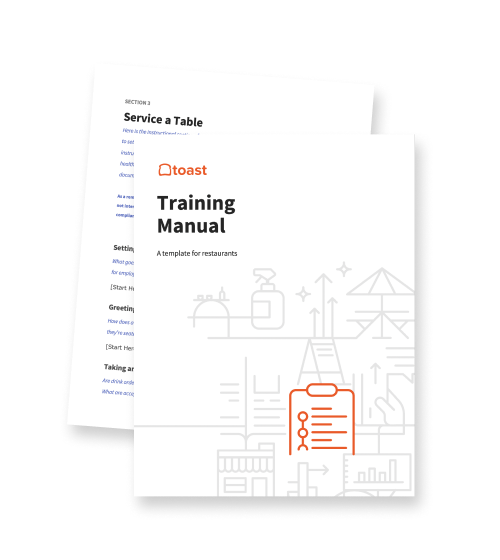
How to Train a Sommelier: Sommelier Training Program (Free Manual Template)
There are several different ways to get the training you need to be a great sommelier. Here are a few to consider.
Aimee LevittAuthor

Training Manual Template
Use this restaurant training manual template, a customizable Word Doc, to provide your staff with the rules, guidelines, and clarity they need to do their jobs efficiently.
Get Free Download | Built for Restaurants
| Built for RestaurantsSommeliers require extra training, expertise, and certifications more than other hospitality jobs. Wine remains a mystery to most people (even those who pretend otherwise). Any restaurant or bar with a decent cellar needs a professional sommelier to guide customers through the wine list and help them choose the best bottle to complement their meal.
Because new wines and innovative processes (biodynamic wine production, for example) are always being invented, even master sommeliers must stay on top of their game. As such, extra training is a great idea for both newbies and veterans.
In this guide, we’ll discuss the best training and skills you need to become a sommelier, walk you through finding and applying for sommelier jobs, and provide some hiring tips for restaurant owners seeking new sommeliers.
What’s in This Guide?
Best Sommelier Training Programs
Required Sommelier Skills
Types of Sommelier Training
Applying for Sommelier Jobs
How to Hire Top Sommeliers
Final Thoughts & FAQs
Employee Handbook Template
Outline your restaurant’s staff policies in this customizable Word doc to help restaurant management and staff get on the same page.

Best Sommelier Training Programs
If you’re a wine enthusiast looking to become a master sommelier, you need to get yourself a wine education. This usually takes the form of formal training at celebrated institutions or online sommelier classes. Pick a method that works for you, but make sure you receive a qualification or certification at the end. Here are some of the best training programs and online classes available.
Formal Sommelier Training Programs
Many globally recognized institutions offer in-person programs you can attend to receive a sommelier certification. Wine programs like these can help you get ahead in the hospitality industry, as you’ll learn valuable skills and wine knowledge that can help you become an expert. Here are some of the world’s best sommelier training programs:
Court of Master Sommeliers: Find both introductory and advanced sommelier training courses at the Court of Master Sommeliers (CMS). Offered in cities around the world, you’ll receive top training from industry experts over an intensive two-day course, with an extensive exam at the end that grants you a full sommelier certification if completed.
National Wine School: The NWS is another respected wine school. Depending on the level of training you choose, you can get introductory, intermediate, or advanced sommelier training, with prices ranging from $300 to $550. In the more advanced sessions, you’ll cover the entire history of wine, from important wine regions and grape varieties to wine sales and modern inventions.
Wine and Spirit Education Trust: With four tiers of programs, the WSET welcomes all types of wine enthusiasts. Level 1 covers basic aspects of the wine business, while the level 4 Master Sommelier Diploma gives you the best training in all things wine-related.
Online Sommelier Training
Any good restaurant sommelier knows the value of ongoing training. Online classes are an affordable and non-committal way to improve your sommelier skills without relocating. They’re best used as supplements to in-person training. Here are some of the best online options:
International Sommelier Guild: One of the most popular online training courses is offered by the International Sommelier Guild. This organization offers five levels of certification in a dozen different languages. Courses last between seven and 24 sessions and cost around $500 to $6,000.
Court of Master Sommeliers (Introductory Course): The CMS also offers novice wine enthusiasts the opportunity to receive professional training from the comfort of their own homes. Their Introductory Sommelier Course can be completed online at your own pace, and if you pass the certified sommelier examination, you’ll receive a formal qualification.
Job Skills Developed in Sommelier Training
Sommeliers need a lot of specific skills to get ahead in the wine world. For example, a good sense of smell and a discernible palate is crucial, but organizational abilities and inventory management competencies are also great restaurant skills to have. From basic to advanced sommelier skills, here are some of the abilities vital to a career as a sommelier.
Basic Sommelier Skills
When you take an introductory sommelier class, you�’ll learn basic skills such as how to taste wine and the differences between the wine-producing regions and grape varieties. These will help you become conversant in the wine world. Introductory courses also teach soft skills, such as time management and customer service. Here are some basic sommelier skills any wine expert should possess:
Wine Knowledge: Any sommelier should have extensive knowledge of the wine industry. From wine-tasting notes to different wine types (like fortified wine and sparkling wine), a wine waiter should know their stuff.
Culinary Skills: Sommeliers need a basic understanding of food alongside their comprehensive wine knowledge. This helps them when pairing food for customers, enhancing the guest experience for your diners.
Customer Service: Sommeliers frequently interact with customers, giving recommendations on things like wine pairings. A competent and successful sommelier will be able to put customers at ease in the often intimidating world of wine and guide them to the best choices off the wine list.
Other restaurant soft skills, such as communication, active listening, time management, and organization, are also valuable traits for a sommelier.
Advanced Sommelier Skills
Advanced training will deepen your knowledge of wine production and theory, sharpen your palate, and improve your wine service game. It will also keep you in the loop with new wines and production styles. Here are some advanced sommelier skills you should learn:
Advanced Wine Knowledge: Master sommeliers should possess sufficient knowledge and experience to correctly identify wines even during blind tasting sessions. This requires lengthy and in-depth wine training.
Inventory Management: A sommelier's possible duties include selecting the wines to stock at your establishment and managing and monitoring the supplies. Inventory management training will help you become a more well-rounded and organized sommelier.
Presentation & Catering: Master sommeliers are often asked to run wine-tasting events or provide professional catering for special occasions. This requires a comprehensive understanding of events management, wine presentation, and catering.
Most people in the hospitality industry know that acquiring a sommelier certification, especially at the advanced and master levels, requires years of study to pass a series of highly competitive exams. As of 2024, there are only 273 master sommeliers in the entire world.
A professional certification shows your commitment to the industry and your willingness to immerse yourself in wine study and culture. It’s a great way to secure a job, impress employers, and leverage promotions to positions like beverage director and restaurant manager.
Types of Sommelier Training
Formal classes, online wine education, and on-the-job training can all help a sommelier be as well-rounded as possible. Here are some of the training categories to help further your career and develop all the skills required to be a top wine expert.
On-The-Job Sommelier Training
Nothing compares to learning by doing. With on-the-job sommelier training, you’ll be working with actual customers immediately or shadowing more experienced sommeliers to see how they do it.
Learning this way gives you plenty of practical experience, and you may even get paid a fair sommelier salary for your work. However, how much you learn depends on how much your coworkers know or how much time they have to teach you. As a result, you may miss out on some of the more technical and academic aspects of wine education.
Formal Sommelier Training Programs
Formal sommelier training programs are recognized and respected in the restaurant industry and provide a thorough and systematic curriculum. In-person classes allow you to ask questions and get real-time answers. You can also learn to taste wines and serve customers with practical training.
However, formal training programs require a lot of extra time and study, including notoriously difficult exams, and they can be expensive. Some do offer scholarships, but they typically also require you to relocate to another city.
Online Sommelier Training
Getting an online sommelier education has many advantages. For example, you can take an online wine course on your own time and in the privacy of your home. You’ll also receive access to some of the world’s best sommeliers at a cost far less than an in-person program.
The disadvantage of learning online is that you’ll have limited opportunities to ask questions and do tastings. I think online training is beneficial, but only when done alongside practical classes or on-the-job training. I therefore advise against relying on online classes for your entire sommelier education.
How to Apply for a Job After Sommelier Training
Being a sommelier means mastering a set of very specific skills, which requires much more study than most other hospitality jobs. When you apply for a job, you should emphasize your training and certifications to get as high a salary as possible.
Many training programs offer networking opportunities, and several institutions, including the Court of Master Sommeliers, have job boards for graduates. Take advantage of these programs to find industry contacts and enquire about open sommelier positions.
There is sommelier work out there if you know where to look, which is why it’s vital to network and maintain contact with industry professionals. The more training you do, the more in-demand your services and abilities will be.
How to Hire Top Sommeliers
Establishments looking to enhance their reputation should employ a trained sommelier to pick the wine menu and provide insightful service to customers. You don’t need to be a specialist wine bar to hire a sommelier, but you do need to stock wine, of course. Here are some ideas for restaurant managers looking to hire top sommeliers:
Build Links to Institutions: Organizations consistently train the best sommeliers, and there are always graduates looking for jobs. Advertise your open sommelier job on university job boards or get in touch with the staff at a respected institution to see if any of their students want a job when they pass their exams.
Use an Employee Handbook: Writing an employee handbook helps your new staff learn the ropes quickly. You can consolidate all the information on your restaurant’s policies, processes, and technology into one document to improve the efficiency of your onboarding process. Your new sommeliers will become part of the team in no time!
Offer On-The-Job Training: Even master sommeliers need consistent training, especially when they’re starting at an establishment for the first time. Providing on-the-job training gets new hires up to speed more quickly and keeps them engaged.
Employee Handbook Template
Outline your restaurant’s staff policies in this customizable Word doc to help restaurant management and staff get on the same page.

Final Thoughts
Extra training and formal certifications are crucial for any professional sommelier. This knowledge will help you succeed in the profession and command a higher salary. Aspiring sommeliers and wine enthusiasts can benefit hugely from seeking out extra educational opportunities and training.
One of the best ways to enrich your sommelier training is to familiarize yourself with restaurant technology. Point-of-sale (POS) and kitchen display systems are widely used in modern establishments, so it’s worth training your tech knowledge to maximize your job efficiency.
If you want to help improve your restaurant’s operations, try the Toast demo today.
FAQs
How hard is level 1 sommelier training?
The level 1 sommelier qualification is the most basic tier of training. A large percentage—typically around 90%—of students complete this, making it the easiest certification to receive. As you advance up the levels, sommelier training becomes harder and harder, with the master sommelier diploma the most difficult to obtain.
Is it easy to become a sommelier?
There are less than 300 master sommeliers in the world, which makes it one of the hardest professions to attain. However, plenty of entry-level and mid-level sommeliers have some qualifications that showcase their abilities. If you’re a real wine enthusiast and love all things wine, receiving some formal sommelier certifications shouldn’t be too hard.
Is it worth becoming a sommelier?
If you manage to rise to the ranks of a master sommelier, you could earn a huge salary—one of the highest in the hospitality industry, in fact. Even mid-level sommeliers get paid a decent wage, and if wine is your passion, it’s certainly a job worth doing.
Related Restaurant Resources
Training Manual Template
Use this restaurant training manual template, a customizable Word Doc, to provide your staff with the rules, guidelines, and clarity they need to do their jobs efficiently.

Is this article helpful?
DISCLAIMER: This information is provided for general informational purposes only, and publication does not constitute an endorsement. Toast does not warrant the accuracy or completeness of any information, text, graphics, links, or other items contained within this content. Toast does not guarantee you will achieve any specific results if you follow any advice herein. It may be advisable for you to consult with a professional such as a lawyer, accountant, or business advisor for advice specific to your situation.
Read More
Subscribe to On the Line
Sign up to get industry intel, advice, tools, and honest takes from real people tackling their restaurants’ greatest challenges.
By submitting, you agree to receive marketing emails from Toast. We’ll handle your info according to our privacy statement. Additional information for California residents available here


